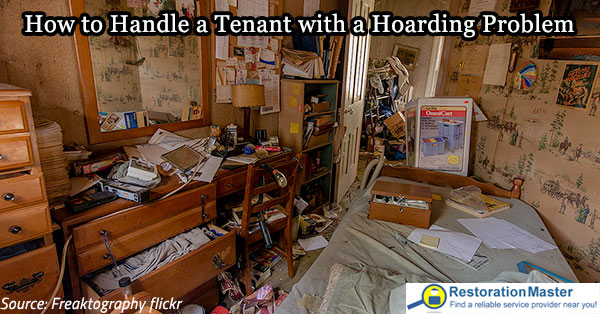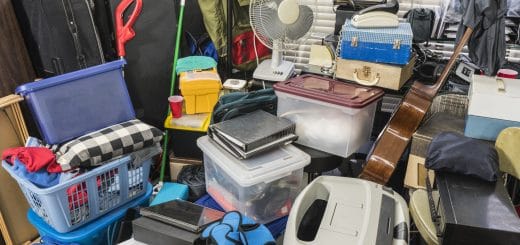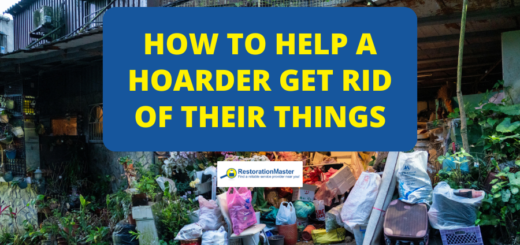Reducing Clutter Helps Prevent Pest Infestations
If you have ever played hide-and-seek, you know that the bigger the clutter, the easier it is to find a good hiding place. Pests are also aware of this universal truth as they are instinctively looking for safe places where they can nest and breed without being disturbed. So, if you are in the habit of piling up useful and useless items alike in your property, don’t be surprised to find out that some pests have “moved in” to settle among the clutter. Actually, many insects and rodents like the clutter, as it provides them everything they need to survive.
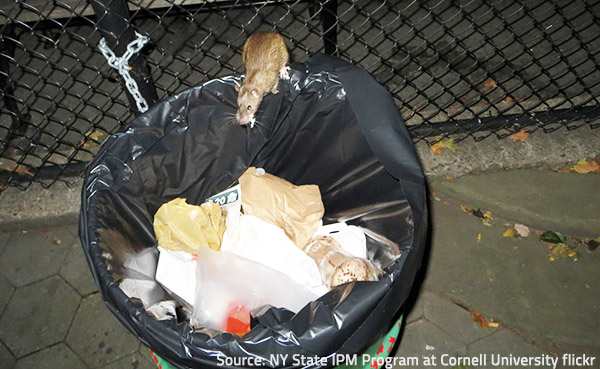
Clutter not only provides perfect hiding places for pests, but can also be a source of food.
Why Clutter Attracts Pests
Clutter poses great challenges in your everyday life – extreme disorganization causes frustration, results in lots of wasted time as you can’t easily find the specific items you need, and often leads to sanitary problems. You may even forget what exactly you have stored in or around your home until time renders it useless or valueless. Worst of all, clutter is quite welcoming for a number of pests. Cluttering your home considerably increases the risk of pest infestation as you may unwillingly provide lodgings for a variety of insects and rodents.
- Clutter provides perfect hiding places. Whether it is wood piles, paper stacks, old furniture pieces, long-forgotten boxes, or whatever miscellaneous items you may have accumulated in your yard or in your home, pests can hide inside, underneath or among them. Once some nuisance animals come upon your clutter, they will build their nests inside the numerous nooks and crannies it provides. Having found such a perfect shelter, they will be able to steer clear of you and will grow in number, unnoticed and undisturbed. When you detect the problem, you will have to deal with major pest infestation;
- Clutter provides sources of food and sometimes even water. Food scraps, pet food, crumbs, and leftovers that fall into hidden spaces, dirty containers, cardboard pieces, or even rotting wood can be excellent sources of food for a variety of pests. Some of them feed on stored fabrics and paper, especially when they become soiled, damp, or moldy. If you allow any of this “appealing” stuff to accumulate in your property without being properly stored, it will serve as a tasty invitation for a number of critters to visit your place.
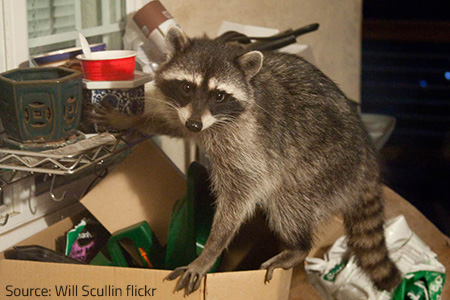
The small nuisance animals usually feel quite at home among your clutter.
Have in mind that damp areas near plumbing in your walls which are very difficult to notice when clutter blocks your view and your access may also attract pests, especially when they result in moldMold is a type of fungus that grows in damp or humid conditi... More (it serves as food for some species). Pests are drawn to standing water, so any dripping or leaking pipes or faucets hidden behind clutter, as well as open water tanks in your yard, considerably increase the chance for pest infestations;
- Clutter provides safe breeding places. Cluttered items may stay as they are for years before you decide to move them around or to get rid of them. This is the main reason why they provide such an ideal breeding place for pests. The nests are well protected and the young can grow up undisturbed. This will continue until the number of pests in your property increases so much that they become a threat to your health and safety.
Without a doubt, pests are very troublesome and once they get inside your home, they can become even dangerous.
Why Pests are Harmful
Pests pose a threat to you and your family, to your pets, and your property. If you are dealing with one critter that accidentally got inside your home, you may have some troubles but the property damages will be minimal and the health risks will be limited. Pest infestation, however, may result in various problems that will have repercussions on your entire lifestyle.
- Bites. Insects leave itchy and/or painful red bumps on the skin and rodents can even cause minor injuries. Bites are usually not very dangerous unless you are allergic or the critter carries virusesViruses are microscopic infectious agents that can only repr... More. However, your pets can be seriously wounded and the risk of rabies is also not to be underestimated;
- Diseases. Whether they bite you or not, pests can still be a threat to your health. Some of them can cause asthma and/or allergies. Many pests carry various parasites and pathogensPathogens are microorganisms such as bacteria, viruses, or f... More and help spread diseases transmitted by fleas and ticks. Pests can contaminate food and water sources, as well as different surfaces in your home, not to mention that they urinate and leave feces all over the place in order to mark their territory;
-
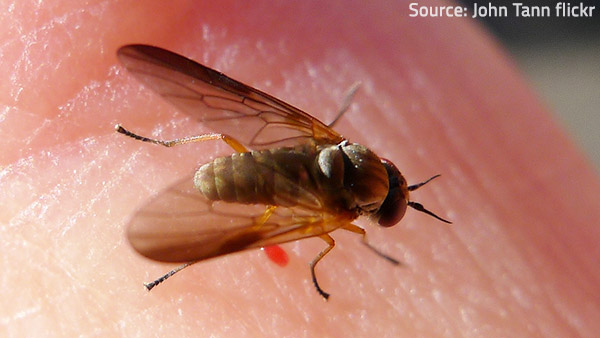
Pests pose a variety of threats to your health and your property.
Damages. Pests often cause substantial property damage – they can chew through your belongings, damage woodwork and internal structures of your home, destroy building materials (mainly insulationInsulation is a material used in buildings to reduce the tra... More), break ductworks, and make holes in walls, screens, or fences. Many pests tend to scatter garbage all over the place and mess up your yard. They can even cause fire hazards if they chew on electrical wiring;
- Sanitary issues. The most common problem caused by pests is unsanitary conditions in your home. The nuisance animals create a mess by bringing dirt into the home and messing up your things and they can also have a horrible smell. They spread bacteria and pathogensPathogens are microorganisms such as bacteria, viruses, or f... More via their urine and droppings and pose a variety of bio-hazardous threats, especially when the carcasses of dead critters remain hidden somewhere among your clutter.
Whatever the specific circumstances in your case are, clutter makes the situation much worse.
Why Clutter Makes Pest Control Difficult
Preventive pest control requires that you keep your property clutter-free. This is important because clutter not only attracts pests but also provides plenty of hiding places and makes effective pest control much more difficult:
- Difficult to detect – pests can easily hide out of sight among the accumulated items and locating them in the clutter becomes almost impossible;
- Difficult to clean – clutter prevents you from cleaning the areas beneath and behind the piled items – all the better for the pests. It is easier to find food and shelter in the dirty, dusty and dark nooks and crannies provided by your clutter;
- Difficult to trap – the great number of cluttered items in your home renders pet control difficult and ineffective. Neither you, nor a pest control professional can properly inspect your place and treat it for pests. There isn’t enough space to place traps or baits, and no way to get insecticide into the numerous inaccessible areas.
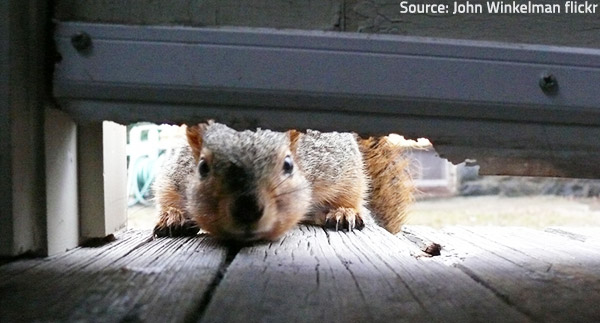
Catch me if you can!
In the event of pest infestation, pest control companies will be able to come up with an efficient solutionA solution is a homogeneous mixture of two or more substance... More but clutter will certainly get in their way and render the entire process slow and difficult. You are advised to declutter your home, so that you avoid the problem in the first place.
How to Prevent Pest Infestations
Without a doubt, keeping pests away will save you from a lot of trouble. There are several simple precautionary measures you can take to prevent pests from entering your property. Reducing clutter or hoarding cleaning is probably the most effective of them.
Keep Your Property Clean
Keeping your yard and your home clean and tidy will greatly discourage pests from making their nests inside your property. So, make it a rule to regularly clean your surroundings:
- Remove debris and dry leaves from your yard;
- Discard trash piles and wood scraps;
- Wash your patio, your garden paths, and your garbage cans with a hose from time to time (so that they don’t smell of food and don’t attract raccoons);
- Frequently wash decorative cushions and covers on outdoor furniture;
- Keep your garage, shed, basement and/or attic neat and in good condition;
- Clean your countertops and tables on a regular basis to prevent food buildup;
- Don’t forget to vacuum your floors frequently to eliminate pests and/or pest eggs.
Make sure everything inside your home is spotless and pest infestations will be unlikely to occur.
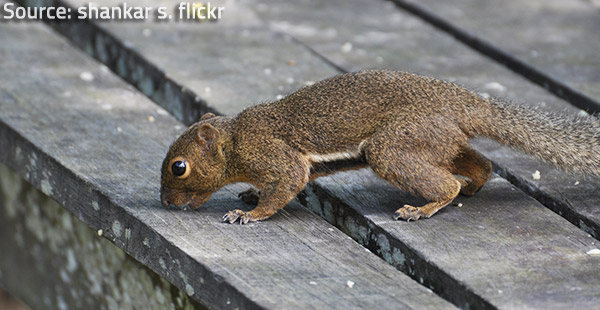
If the little rascals can find a way in, they will take advantage of the convenient shelter your home provides.
Keep Your Property in Good Condition
Maintain your property well to block the access points to your home. Install a strong fence that extends several feet above ground and at least one foot underground to ensure that small rodents will not jump over or burrow under it. Inspect your roof and your porch carefully, repairRepair is the act of fixing or restoring damaged property, m... More cracks and broken ducts, and close off any holes in walls, foundations, and vents with metal mesh. The small intruders will not find an easy entryway and may give up the idea of visiting your home.
Use Preventive Pest Control Products
Install screens on your windows or storm doors to be able to let fresh air in and keep insects out. Use zappers, sprays, sticky paper, and other pest control products and traditional repellents to drive critters away. Bright light and the scent of ammonia or bleach will also help a lot, as well as some modern devices, such as a motion activated sprinkler system which will activate every time an animal comes in its reach.
Don’t import pests
Check your pets for fleas every time they come back home from a walk. Examine dried food packages for worms, beetles, moths, and other pests before you buy them. Make it a rule to regularly replace the food stored in your home and to inspect the fabrics you rarely use (take them out on a sunny day at least twice a year to shake them off and air them).
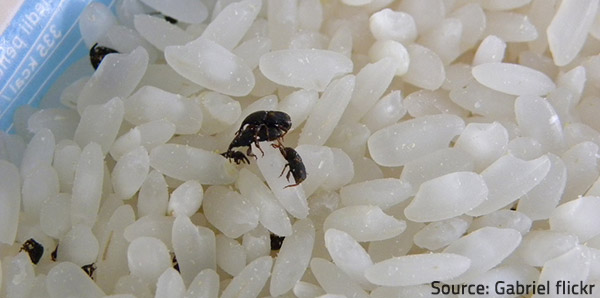
Pests feed on stored food that is not properly sealed.
Keep Your Property Clutter-Free
Deny pests food and shelter and you may avoid the problem altogether. Decluttering your home will do the trick for you.
- Remove potential shelters. TrimTrim is the decorative or functional molding used to finish ... More trees, shrubs and weeds and avoid keeping wood piles, paper stacks, and other accumulated materials in your yard. Clean all the clutter both inside and outside your home, so that the pests have nowhere to hide or to nest;
- Remove everything edible. Keep pet food inside, clear away any rotting fruits or vegetables (as well as food leftovers), store food in airtight containers, close your trash cans tight and empty them regularly – if they don’t have access to anything edible, pests will lose their primary stimulus for entering your property.
Cleaning clutter or hoarding cleaning will considerably help you prevent pest infestations and make your place tidier, nicer, and much more attractive. Clean your property regularly and organize your items in a tidy and systematic manner, so that you can enjoy your clutter-free and pest-free home and ensure your peace of mind.










